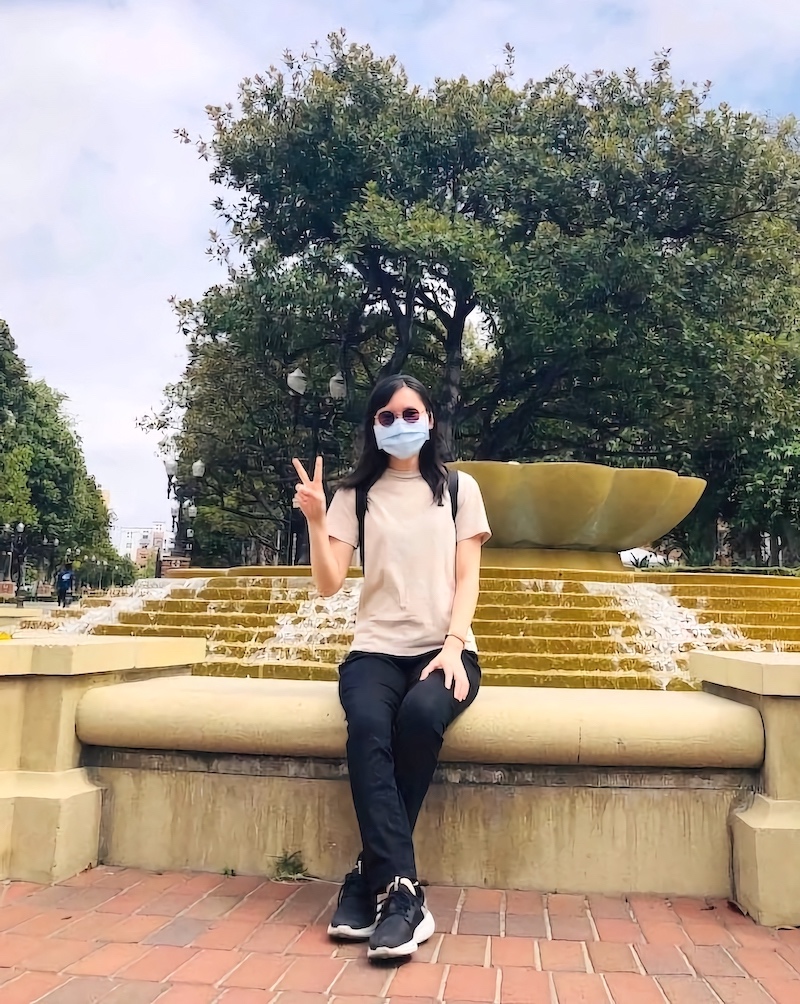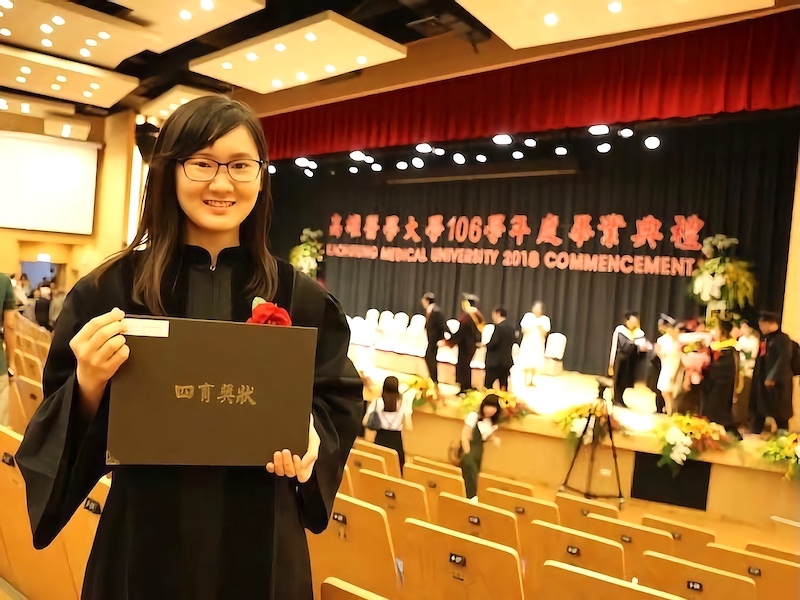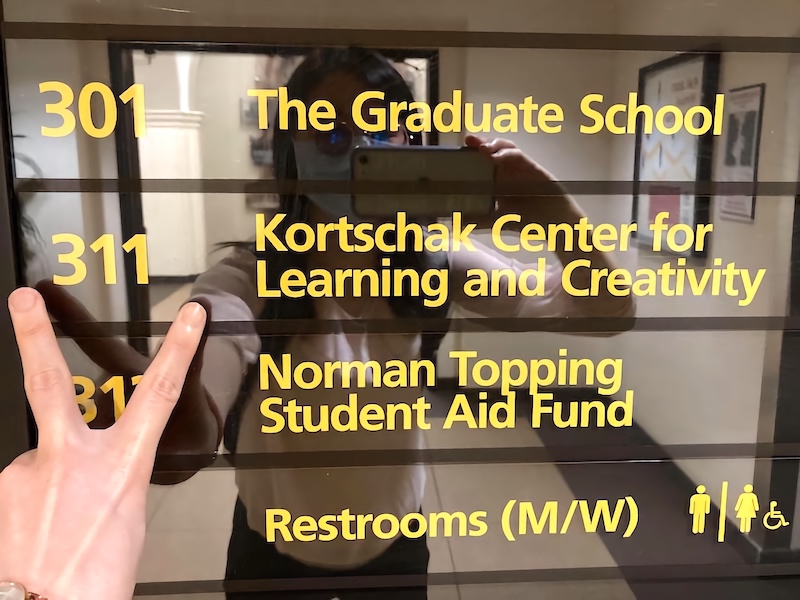Perspectives of a Post-Professional MA to OTD Student: Amy Yeu
September 29, 2021
by Global Initiatives Team
Classes Externships International
Su-Min (Amy) Yeu, OTD
By Michelle Plevack
Entry-Level Professional Master’s student
In collaboration with Maggie Chen and Prutha Satpute
Global Initiatives OTDs
Editors Alison Chang, Vanessa Elshamy, and Brittany Inouye
Entry-Level Professional Master’s students

First photo Amy took at USC — OTD, Fall 2021
Global Initiatives OTD Maggie Chen had the opportunity to interview international student, Su-Min (Amy) Yeu. Michelle Plevack wrote this blog with the purpose of sharing Amy’s perspectives of her transition from USC’s Post-Professional Master’s Program to the Post-Professional Doctorate of Occupational Therapy (OTD) Program.
What are some of the factors that influenced your decision to continue your education with the OTD?
Amy: I considered professional, personal, and program aspects. Professionally, I thought about my future career and my goals. As an international student, I thought about what I was interested in but could not learn in my hometown. For example, I know that OT in the United States focuses on health promotion, an area I am interested in. I also thought about the timeline and pathway that I am going to take in the future. For example, when am I going to do the OTD and how long is the program going to be?
Personally, I hope to return to Taiwan. I also thought: if I am not going to do the OTD, then what am I going to do? Am I going to work in the US or am I going back to Taiwan? I also thought about the difference if I did not have the degree: is it only because I want to earn another credential, or is there anything else that is important to me? Another thing I considered was employment, of course. Like many students, I have concerns about paying tuition and looked into residencies that might offer a scholarship or stipend for me. As far as personal goals, it was important for me to travel abroad and to gain new experiences in the US.
Considering programs, I was interested in non-traditional tracks that focus on health and wellness and international relationships. I know at USC they have clinical, research, administration, and pedagogy tracks. I ended up being placed with the Kortschak Center for Learning and Creativity (KCLC — clinical track) at USC which I am very grateful for, and I know at USC, I can choose to have a subspecialty — in research, for example — that could contribute to my career goals.

Commencement: Kaohsiung Medical University; Kaohsiung, Taiwan — Senior, 2018
What goals have you set for yourself during your OTD? Why is the OTD beneficial to your future goals and career?
Amy: I want to network and build relationships within the USC community and improve my clinical skills by utilizing my therapeutic use of self, motivational interviewing, and evidence-based knowledge. With these skills, I can not only provide services appropriately, efficiently, and holistically to all students, but also appropriately refer students to other services. As I know these services are not currently popular in Taiwan, I hope to show the efficacy of the services at KCLC by conveying the unique roles and skills of occupational therapy and academic coaching services in universities. My future goal is to improve the quality of life of university students in Taiwan, particularly as a result of the COVID-19 pandemic, by implementing and developing novel ideas into on campus services. I believe having a doctorate level of education at international conferences will allow me to effectively advocate for essential services and pioneer the roles of OTs working in universities.
How has the transition from Post-Professional MA to OTD been?
Amy: This transition looks different depending on what track you are taking. For my clinical track, I spend most of my time in my residency at 20 or 40 hours a week. Compared to being an Post-Professional MA student, your role changes as an OTD student, as you are ‘in the driver’s seat’ where you need to be self-directed, proactive, and create your own structure to support your goals. However, because I am more settled into my role after the MA program, I feel less anxious and confused, and even excited about my coursework. Consequently, compared to being an MA student, there are fewer social opportunities with peers due to the nature of the coursework for the OTD program.
What has been the best and hardest part of the OTD so far?
Amy: The best part is my residency — I feel like I am seeing the endless possibilities of occupational therapy. There have been so many opportunities during the process of integrating my knowledge, experiences, and passions in a way where I am ‘learning by doing’. I get to wake up excitedly, not only because of schoolwork, but also because I am pursuing my dreams while collaborating with people who share the same goals, values, and beliefs. Some difficult aspects of the OTD for me as an international student are the language and cultural barriers, particularly while sharing thoughts. I am still figuring out how to provide services and express my perspectives with the KCLC team in an effective and efficient manner. Due to the cultural differences between myself, clients, and peers, I am also not always familiar with a place or experience they might reference to. Finally, learning to be more flexible due to the uncertainties of the pandemic, such as adjusting to hybrid services, has been a challenging transition as well.
How have you been balancing leisure and personal time with OTD responsibilities?
Amy: I try to be patient and kind to myself. Luckily, I work in a residency that promotes the importance of work-life balance and recommends us to not bring work home. I also try to focus on self-care activities, setting up short breaks, making time for myself, journaling, having snacks, listening to music, catching up with family, and socializing with friends on weekends.
What advice would you give to students about the OTD?
Amy: For those indecisive about the OTD, I would recommend connecting with professors, residents, and other peers who are interested in discussing the OTD. In my experience as a MA student, it can be hard to decide one month into the program if the OTD is right for you. And even though I am very satisfied with my residency, I regret not applying to even more sites! Remember that post-graduation, you do not need to stick to whatever you do for your OTD. If you are planning on doing the OTD, consider what you want to get out of this program. You won’t regret it! Keep dreaming big! Jot down your thoughts, journal, and think deeper. Remember there are no restrictions with what you can do with an OT background. Consider being open to roles or positions not necessarily called OT if they relate to your passions.

Amy’s residency: USC Kortschak Center for Learning and Creativity; Los Angeles — OTD, 2021
⋯
Next by tag Classes ⟩ Externships ⟩ International ⟩
⋯





